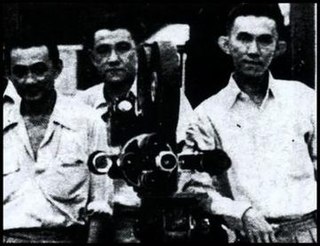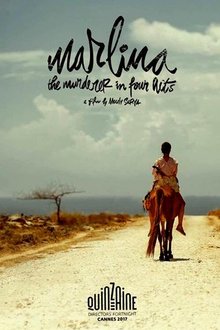
Oemar Said Tjokroaminoto, better known in Indonesia as H.O.S. Tjokroaminoto, was an Indonesian nationalist. He became one of the leaders of the Islamic Trade Union, founded by Samanhudi, which became Sarekat Islam, which they both cofounded.
The Experience is a 1973 Iranian feature film directed by Abbas Kiarostami. It is Kiarostami's feature-length directorial debut.

Malin Kundang is a popular folktale in Indonesian folklore that originated in the province of West Sumatra. The folktale tells of an ungrateful son named Malin Kundang and centers around the themes of disobedience and retribution that turned him into stone. Aside from this folktale, there are several other similar variations across South East Asia including Si Tanggang and Nakhoda Manis that originated in Malaysia and Brunei.
Si Pitung was a 19th-century bandit in Batavia, Dutch East Indies. His exploits have since become legendary, with numerous accounts of his life, deeds, and death.

Rano Karno is an Indonesian actor and politician who served as Governor of Banten from 2014 to 2017. As a result of his fame gained from his acting career, he is known for starring in the 1979 film Gita Cinta dari SMA.

Sjumandjaja was an Indonesian director, screenwriter, and actor. During his career he wrote numerous films, directed fourteen, acted in ten, and produced nine; he also won five Citra Awards from the Indonesian Film Festival. His films reflected social realism.

Mafia K-1 Fry sometimes stylized as Mafia K'1 Fry is a French collective of hip hop artists, rappers, beatboxers, DJs, MCs and music producers mostly coming from the Val-de-Marne and the Orly-Choisy-Vitry-Joinville axis, suburbs located south of Paris.
Si Pitoeng is a film from the Dutch East Indies that was released in 1931. Directed by the Wong brothers and starring Herman Shim and Ining Resmini, it was the first film based on the life of Si Pitung, a bandit from Batavia.

The Wong brothers were three ethnic Chinese film directors and cameramen active in the cinema of the Dutch East Indies. The sons of an Adventist preacher, the brothers – Nelson (1895–1945), Joshua (1906–1981), and Othniel (1908–1986) – received much of their education in the United States before going to Shanghai and establishing The Great Wall Productions.
Tan Tjoei Hock was an Indonesian journalist and filmmaker. Born in Batavia, he was discovered by The Teng Chun in the late 1930s. Tan became one of the most productive film directors of the Dutch East Indies between 1940 and 1941, directing nine films – primarily action.
Si Ronda is a 1930 silent film from the Dutch East Indies which was directed by Lie Tek Swie and starred Bachtiar Effendi. Based on contemporary Betawi oral tradition, it follows the exploits of a bandit, skilled in silat, known as Si Ronda. In the lenong stories from which the film was derived, Ronda was often depicted as a Robin Hood type of figure. The production, now thought lost, was one of a series of martial arts films released between 1929 and 1931. Si Ronda received little coverage in the media upon its release. A second adaptation of the tale, Si Ronda Macan Betawi, was made in 1978.
Si Tjonat is a likely lost 1929 bandit film from the Dutch East Indies directed by Nelson Wong and produced by Wong and Jo Eng Sek. Based on the novel by F.D.J. Pangemanann, the silent film followed an indigenous man who, having killed his fellow villager, flees to Batavia and becomes a bandit. After kidnapping an ethnic Chinese woman, he is defeated and brought to justice.

Lenong is a traditional theatrical form of the Betawi people in Jakarta, Indonesia.

Roesia si Pengkor, also known as Hadji Saleh, is a 1939 film from the Dutch East Indies which was directed and produced by The Teng Chun for his Java Industrial Films. Starring Da'ing, Bissu, and Hadidjah, this black-and-white film followed a young woman who is saved from deceptive suitors by her beloved and a man known as "Si Pengkor".

Si Gomar is a 1941 film from the Dutch East Indies which was written and directed by Tan Tjoei Hock and produced by The Teng Chun. Starring Hadidjah, Mohamad Mochtar, and Tan Tjeng Bok, the movie follows a brother and sister who are separated by robbers and almost marry before their cousin recognises them.

Produksi Film Negara is an Indonesian state-owned film funding company, previously a film production company. PFN is one of the pioneers in Indonesian film industry at the time when it is formed.

Aminah Tjendrakasih was an Indonesian actress best known for her appearance as Lela in the television series Si Doel Anak Sekolahan. Beginning her career in her teenage years, Cendrakasih had her first starring role in 1955's Ibu dan Putri. She soared to popularity after taking a role in Serampang 12 along with Nun Zairina in 1956. Cendrakasih acted in more than a hundred feature films; in 2012 and 2013 she received Lifetime Achievement Awards from the Bandung Film Festival and the Indonesian Movie Awards.

Abdul Hamid Arief was an Indonesian actor who appeared in more than 120 films. Born in Batavia, Dutch East Indies, he started his acting career in theatre before migrating to film with 1948's Anggrek Bulan. His first starring role, and the one from which he first gained recognition, was as the title character in Pangeran Hamid. Over subsequent decades he was a productive film actor, often appearing in four or five films a year. He also acted in various television series.

Marlina the Murderer in Four Acts is a 2017 Indonesian thriller film directed by Mouly Surya based on a story conceived by Garin Nugroho and a screenplay co-written by Surya and Rama Adi. The film's Western style, its feminist tone, and rural Indonesian setting led to the term "satay Western" being coined following its world premiere in the Directors' Fortnight section of the 2017 Cannes Film Festival.












